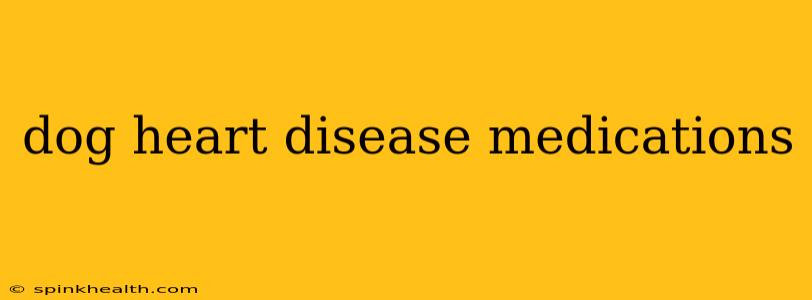Heart disease in dogs, a heartbreaking reality for many pet owners, is a complex issue with a variety of underlying causes and treatment approaches. This isn't just about a single "cure-all" medication; managing canine heart disease often involves a carefully tailored approach using a combination of drugs, lifestyle adjustments, and regular veterinary monitoring. Let's delve into the world of dog heart disease medications, exploring the common types, their purposes, and the importance of working closely with your veterinarian.
My name is Dr. Emily Carter, and I've dedicated my career to veterinary cardiology. While I can't provide specific medical advice (always consult your vet!), I can offer a comprehensive overview to help you understand the complexities of managing your canine companion's heart health.
What are the common types of heart disease in dogs?
Before we dive into medications, it's crucial to understand that different types of heart disease require different treatments. Common conditions include:
- Dilated Cardiomyopathy (DCM): The heart muscle weakens and stretches, reducing its pumping efficiency.
- Hypertrophic Cardiomyopathy (HCM): The heart muscle thickens, making it harder for the heart to pump blood effectively.
- Valvular Disease: Problems with the heart valves, such as mitral valve disease, lead to leakage or obstruction of blood flow.
- Congestive Heart Failure (CHF): A condition where the heart can't pump enough blood to meet the body's needs, often a consequence of other heart conditions.
What medications are used to treat dog heart disease?
The medications prescribed will depend heavily on the type and severity of your dog's heart condition and their individual needs. Commonly used medications include:
-
ACE Inhibitors (e.g., Enalapril, Benazepril): These medications help to relax blood vessels, reducing the workload on the heart. They're often used to treat dogs with DCM and CHF.
-
Beta-Blockers (e.g., Carvedilol, Atenolol): These slow the heart rate and relax the heart muscle, improving its efficiency. They're particularly beneficial for dogs with HCM.
-
Diuretics (e.g., Furosemide, Spironolactone): These help to remove excess fluid from the body, reducing congestion and easing breathing difficulties associated with CHF.
-
Pimobendan: This medication improves the heart's contractility (ability to pump blood) and relaxes blood vessels. It's often used in dogs with DCM and CHF.
How are these medications administered to dogs?
Medications are typically administered orally, with tablets or capsules being the most common form. Your veterinarian will provide specific instructions on dosage, frequency, and administration techniques. It's crucial to follow these instructions precisely to ensure the medication's effectiveness and minimize the risk of side effects.
What are the side effects of heart medications for dogs?
Like any medication, heart medications can have potential side effects. These can vary depending on the specific drug and your dog's individual response. Common side effects might include:
- Loss of appetite
- Vomiting
- Diarrhea
- Lethargy
- Increased thirst or urination
If you notice any concerning side effects, contact your veterinarian immediately.
What is the prognosis for dogs with heart disease?
The prognosis for dogs with heart disease varies greatly depending on the type and severity of the condition, the dog's overall health, and the effectiveness of the treatment. With proper management, many dogs can live comfortable and fulfilling lives for years after diagnosis. Regular veterinary check-ups, careful monitoring of medication, and a supportive home environment are crucial for a positive outcome.
How can I help my dog with heart disease?
Beyond medication, you can play a vital role in managing your dog's heart condition:
- Follow your vet's instructions meticulously.
- Maintain a healthy weight.
- Provide regular exercise, but avoid strenuous activity.
- Feed a high-quality diet appropriate for their condition.
- Monitor your dog closely for any changes in behavior or symptoms.
This information serves as an educational resource and should not replace professional veterinary advice. Always consult your veterinarian for diagnosis and treatment of your dog's heart condition. Early detection and proactive management are key to improving your canine companion's quality of life. Remember, your veterinarian is your most valuable resource in navigating this journey.

